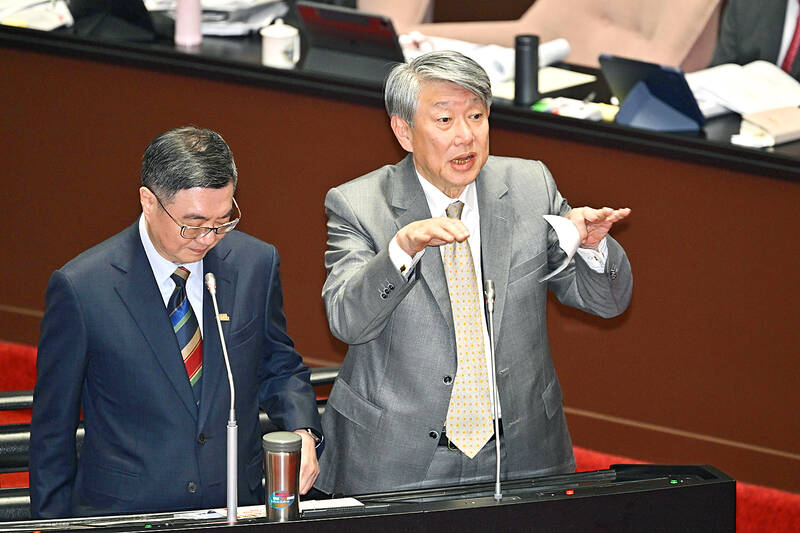The government will not accept “unfair” US tariffs on Taiwan’s chips, Minister of Economic Affairs J.W. Kuo (郭智輝) said yesterday.
Kuo declined to expand on the comments, saying that any elaboration might affect ongoing negotiations.
He described the tariff issue as a “negotiation strategy” of US President Donald Trump.

Photo: Tu Chien-jung, Taipei Times
It was more important to focus on what Trump hopes to gain, he said, adding that as the US president wants fair competition, tariff negotiations were the quickest route.
Kuo said he has hosted discussions with hundreds of businesses on US tariffs and their possible influence on domestic industries, providing Taiwan’s negotiators the basic demands and issues businesses have raised.
“Taiwan is helping your [trade partners] industries to make money, not making money from you,” he said, adding that it would benefit Taiwan’s participation in international technology and economic events if its trade partners understood that.
Deputy Minister of Economic Affairs Cynthia Kiang (江文若) visited the US earlier this month to collect information to more accurately pinpoint what Washington wants and enhance negotiations, Kuo said.
On Tuesday, he told the legislature that a 100 percent tariff was “not unnecessarily unreasonable,” a remark that has raised eyebrows by some people, but the minister did not elaborate on it yesterday.
US media have reported that Taiwan Semiconductor Manufacturing Co (TSMC, 台積電), the world’s largest contract chipmaker and a major supplier to US companies such as Apple Inc and Nvidia Corp, has been in talks for a stake in Intel Corp as pressures from Trump’s new policies toward Taiwan’s chip industry increase.
Neither TSMC nor Intel has confirmed the reports and the Ministry of Economic Affairs said it had not received information about any overseas investment application from TSMC.
Trump has accused Taiwan of taking away the US’ semiconductor business, saying he wants the industry to manufacture more in the US.
The ministry said in a statement yesterday that the government’s primary concern was fair practices that allow Taiwan to maintain its advantages over its competitors.
The Mainland Affairs Council also said in a statement that TSMC was an “important Taiwanese company.”
“In response to the challenges posed by Trump’s new policies toward our semiconductor industry and TSMC, our government will work closely with industry to maintain Taiwan’s leading position in the field of advanced technology,” the council said, without elaborating.
Additional reporting by Reuters

SETBACK: Apple’s India iPhone push has been disrupted after Foxconn recalled hundreds of Chinese engineers, amid Beijing’s attempts to curb tech transfers Apple Inc assembly partner Hon Hai Precision Industry Co (鴻海精密), also known internationally as Foxconn Technology Group (富士康科技集團), has recalled about 300 Chinese engineers from a factory in India, the latest setback for the iPhone maker’s push to rapidly expand in the country. The extraction of Chinese workers from the factory of Yuzhan Technology (India) Private Ltd, a Hon Hai component unit, in southern Tamil Nadu state, is the second such move in a few months. The company has started flying in Taiwanese engineers to replace staff leaving, people familiar with the matter said, asking not to be named, as the

The prices of gasoline and diesel at domestic fuel stations are to rise NT$0.1 and NT$0.4 per liter this week respectively, after international crude oil prices rose last week, CPC Corp, Taiwan (台灣中油) and Formosa Petrochemical Corp (台塑石化) announced yesterday. Effective today, gasoline prices at CPC and Formosa stations are to rise to NT$27.3, NT$28.8 and NT$30.8 per liter for 92, 95 and 98-octane unleaded gasoline respectively, the companies said in separate statements. The price of premium diesel is to rise to NT$26.2 per liter at CPC stations and NT$26 at Formosa pumps, they said. The announcements came after international crude oil prices

SinoPac Financial Holdings Co (永豐金控) is weighing whether to add a life insurance business to its portfolio, but would tread cautiously after completing three acquisitions in quick succession, president Stanley Chu (朱士廷) said yesterday. “We are carefully considering whether life insurance should play a role in SinoPac’s business map,” Chu told reporters ahead of an earnings conference. “Our priority is to ensure the success of the deals we have already made, even though we are tracking some possible targets.” Local media have reported that Mercuries Life Insurance Co (三商美邦人壽), which is seeking buyers amid financial strains, has invited three financial

CAUTION: Right now, artificial intelligence runs on faith, not productivity and eventually, the risk of a bubble will emerge,’ TIER economist Gordon Sun said Taiwanese manufacturers turned more optimistic last month, ending a five-month streak of declining sentiment as concerns over US tariffs, currency volatility and China’s overcapacity began to ease, the Taiwan Institute of Economic Research (TIER) said yesterday. The manufacturing business confidence index rose 1.17 points from June to 86.8, its first rebound since February. TIER economist Gordon Sun (孫明德) attributed the uptick to fading trade uncertainties, a steadier New Taiwan dollar and reduced competitive pressure from Chinese producers. Taiwan’s semiconductor industry is unlikely to face significant damage from Washington’s ongoing probe into semiconductors, given the US’ reliance on Taiwanese chips to power artificial